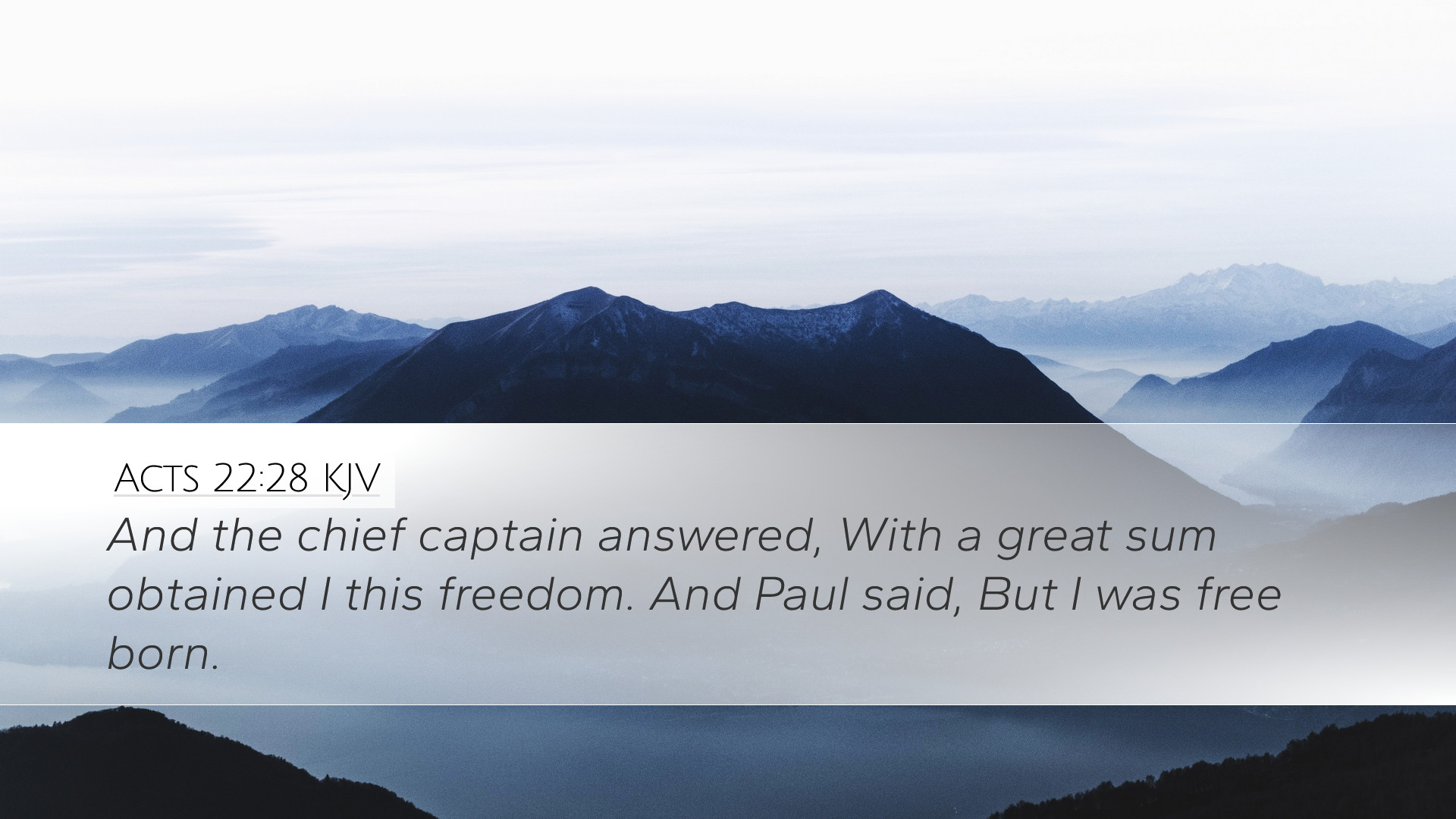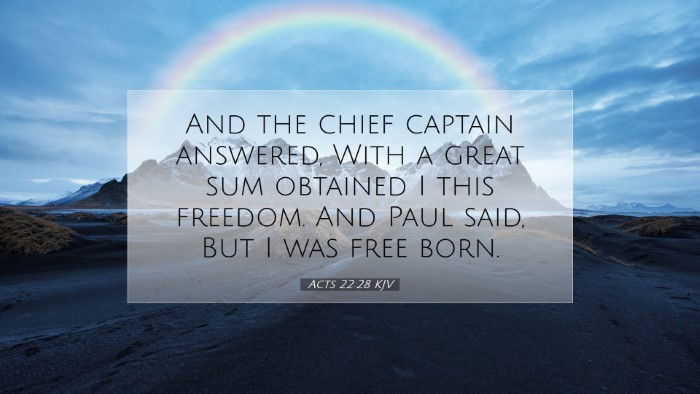Commentary on Acts 22:28
Acts 22:28 presents a pivotal moment in the life of the Apostle Paul during his defense before the Jewish audience in Jerusalem. The verse states:
"And the chief captain answered, With a great sum obtained I this freedom. And Paul said, But I was free born."
Contextual Overview
This passage occurs within a larger narrative where Paul is being falsely accused and has been taken into custody by the Roman authorities. The verse serves as a key point of contrast between the Roman citizenship that the chief captain boasts of and Paul’s inherent and birthright freedom. Understanding the social and legal implications of citizenship in the Roman Empire is critical to interpreting the significance of Paul’s statement.
Insights from the Commentaries
Matthew Henry's Commentary
Matthew Henry emphasizes the humility of Paul in stating that his freedom did not come at a cost, unlike the chief captain who acquired his citizenship through monetary means.
- Contrast of Citizenship: Henry highlights that Paul’s citizenship was not merely an acquisition but a divine heritage, signifying God's providential care over his life.
- Value of Birthright: The commentator points out that Paul’s declaration ("But I was free born") illustrates a significant privilege that comes by birth, suggesting a deeper spiritual freedom that ties to his identity as a follower of Christ.
- Implications for Ministry: Henry notes that Paul’s Roman citizenship became pivotal for his ministry, providing him with legal protections to further the Gospel.
Albert Barnes' Notes on the Bible
Albert Barnes provides a detailed exegesis focusing on the historical background and legal framework surrounding Roman citizenship at the time.
- Acquisition of Citizenship: Barnes explains that Roman citizenship could be obtained through various means—serving in the military, purchase, or being born into free families. This distinction emphasizes the privilege Paul had as one born a citizen.
- Nature of Paul’s Response: His assertion that he was 'free born' signifies not only a statement of fact but also a reminder of the superiority of his status in light of challenges faced from the Jewish leaders.
- Legal Rights of Citizens: Barnes details the rights that come with citizenship, stressing that Paul’s claim was crucial in validating his appeal to the Roman authorities, which played a significant role in the unfolding of the narrative.
Adam Clarke's Commentary
Adam Clarke brings forth insights on the cultural and social implications of liberty and servitude in the Greco-Roman world.
- Cultural Significance: Clarke highlights the esteem with which Roman citizenship was held, pointing out that for many, it represented not just freedom, but societal status.
- Paul's Background: Clarke elaborates on Paul’s Jewish heritage and how his ability to claim citizenship connects with the narrative of God’s call on Paul’s life.
- Theological Implications: The commentary suggests that Paul’s freedom is representative of the believer's freedom in Christ, emphasizing the theological thread of liberation that is woven throughout the New Testament.
Thematic Reflections
The confrontation with the chief captain gives rise to several themes that are pertinent for pastors, theologians, and students of the Word:
- Privilege and Responsibility: Paul’s citizenship highlights both privilege and the responsibility that accompanies such status in advancing the Gospel.
- Spiritual vs. Temporal Freedom: The distinction between physical freedom and spiritual freedom prompts reflection on the deeper freedoms that believers enjoy in Christ.
- Grace and Heritage: A consideration of how believers are born into a new identity in Christ, necessitating recognition of the grace that grants them their spiritual standing.
Application for Modern Believers
In examining Acts 22:28, modern believers are encouraged to reflect on their own spiritual heritage and the privileges that come with being a citizen of the Kingdom of God:
- Embrace Your Identity: Believers should recognize the identity they possess in Christ and the freedom that comes with it.
- Utilize Your Citizenship: Understanding the rights and responsibilities of being part of God’s kingdom can empower believers to confront challenges in their faith with confidence.
- Witnessing with Courage: Just as Paul utilized his Roman citizenship to further the Gospel, believers must be courageous witnesses in their contexts, leveraging their unique backgrounds and status to proclaim the message of salvation.
Conclusion
Acts 22:28 invites deep exploration into the nature of freedom, identity, and the believer’s role in the world. The insights derived from the commentaries by Matthew Henry, Albert Barnes, and Adam Clarke enrich our understanding, offering both theological depth and practical application. As believers navigate their spiritual journeys, the profound truths found in this verse encourage them to embrace their heritage as a precious gift that empowers them to live out their faith boldly in every sphere of life.


